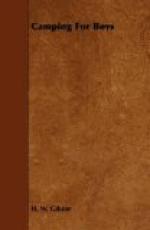MORNING PRAYER HYMN FOR BOYS’ CAMPS
To be sung at morning meal
Words and Music by H. W. Gibbon.
[Illustration: Music]
Morning
Gracious Giver of all good,
Thee we thank for rest and food.
Grant that all we do or say
In Thy service be this day.
Noon
Father for this noonday meal
We would speak the praise we feel,
Health and strength we have from Thee,
Help us, Lord, to faithful be.
Night
Tireless guardian of our way,
Thou hast kept us well this day.
While we thank Thee, we request
Care continued, pardon, rest.
-Camp Wawayanda.
[Illustration: Forest scene]
Go abroad upon the paths of Nature,
And when all its voices whisper, and its silent things
Are breathing the deep beauty of the world—
Kneel at its ample altar.-Bryant.
CHAPTER X—THE CAMP FIRE
How to build A camp fire
prevent spread of fire
forest fire laws
how to light A fire
story telling
marshmallow toasts and corn roasts
A story, “How men found
the great spirit”
There is an impalpable, invisible, softly stepping delight in the camp fire which escapes analysis. Enumerate all its charms, and still there is something missing in your catalogue. —W. C. Gray in “Camp Fire Musings.”
“I cannot conceive of a camp that does not have a big fire! Our city houses do not have it, not even a fireplace. The fireplace is one of the greatest schools the imagination has ever had or ever can have. It is moral, and it always gives a tremendous stimulus to the imagination, and that is why stories and fire go together. You cannot tell a good story unless you tell it before a fire. You cannot have a complete fire unless you have a good story-teller along.” [1] Anyone who has witnessed a real camp fire and participated in its fun, as well as seriousness, will never forget it. The huge fire shooting up its tongue of flame into the darkness of the night, the perfect shower of golden rain, the company of happy boys, and great, dark background of piney woods, the weird light over all, the singing, the yells, the stories, the fun, then the serious word at the close, is a happy experience long to be remembered.
[Footnote 1: Dr. G. Stanley Hall, “Camp Conference Report,” p. 40.]
To Build a Fire




